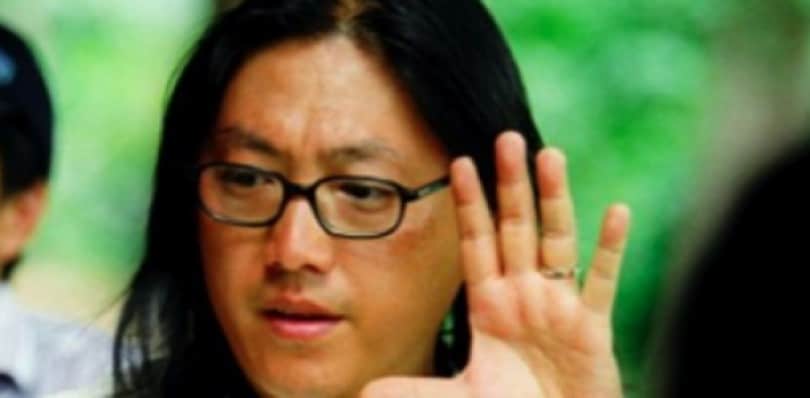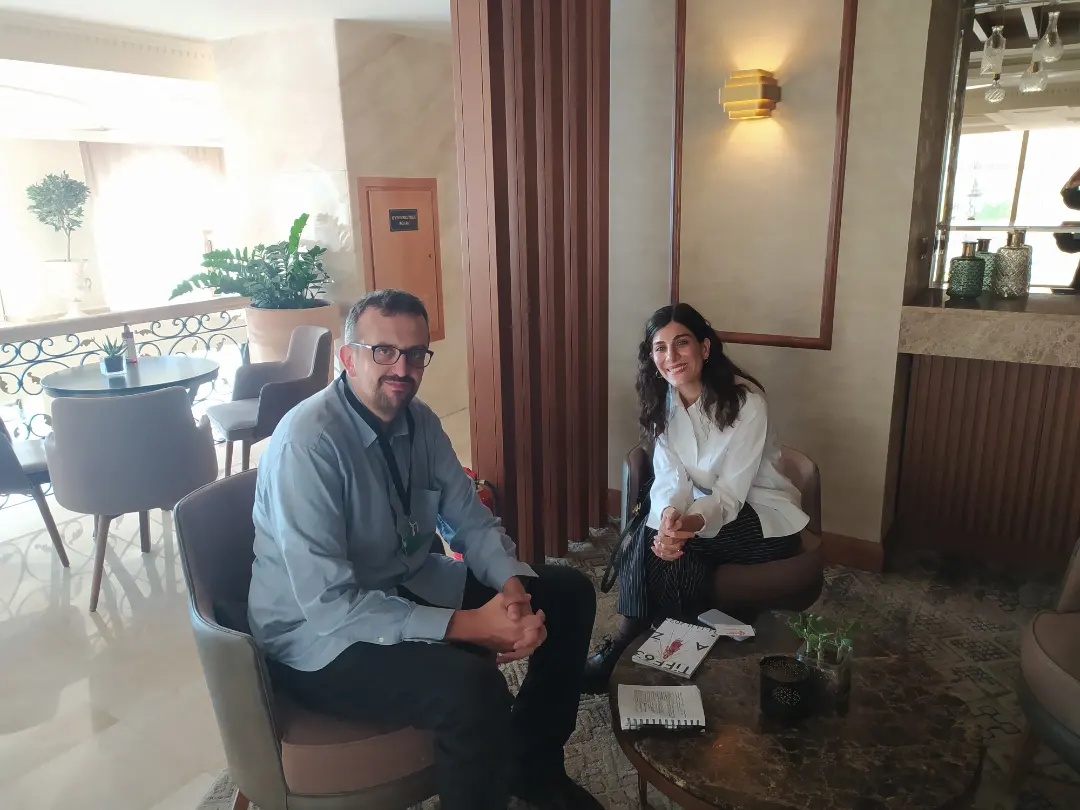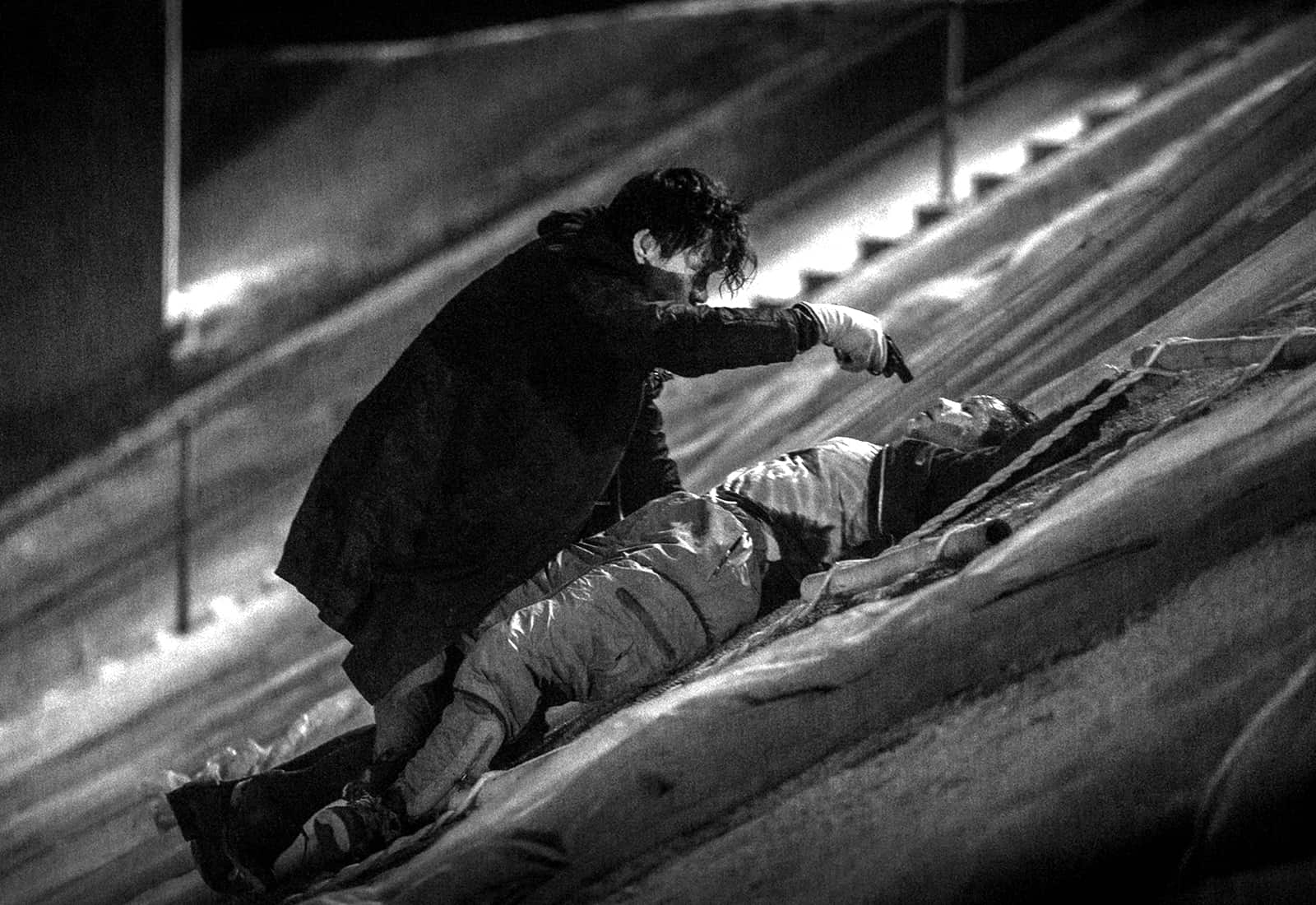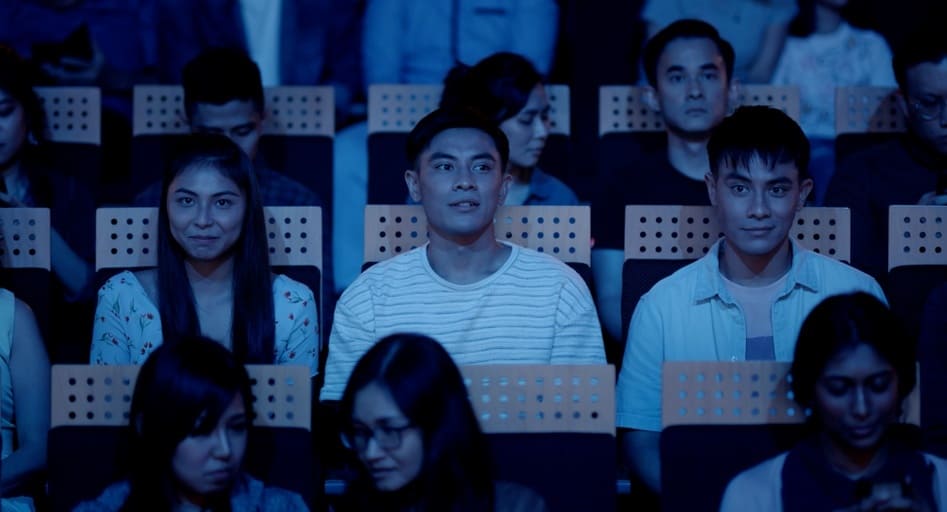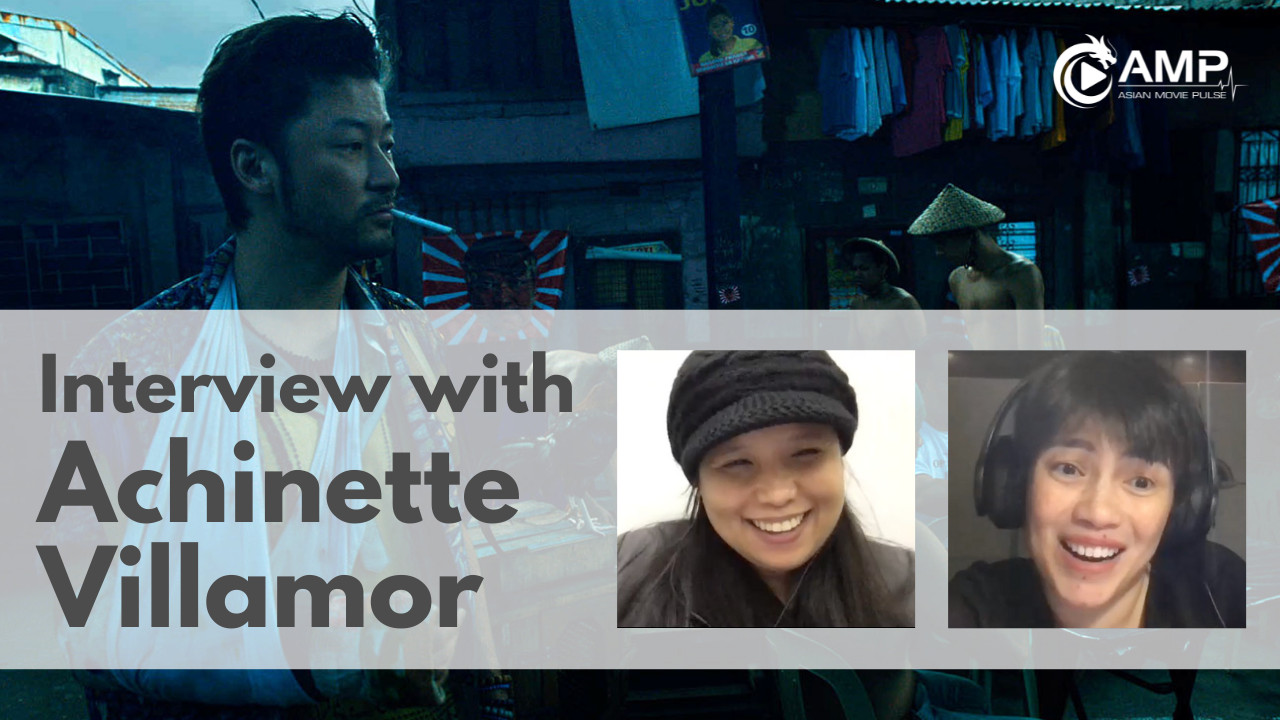Kenneth Bi's directorial debut, Rice Rhapsody (2004), won Outstanding Screenplay from Taiwan's GIO and screened at the Tokyo International Film Festival. The Drummer (2007) was selected for competition at the Sundance Film Festival and opened the 2008 Toronto Reel Asian International Film festival. It also won Best Supporting Actor (Tony Leung Ka Fai) at the Golden Horse Awards. In 2010, Bi followed up with the topical social drama, Girl$, and in 2013, he directed the neo-noir suspense thriller Control, starring Daniel Wu, Simon Yam, Yao Chen and Leon Dai. Wish You Were Here is Bi's fifth film.
On the occasion of “Wish You Were Here” having it's North American debut at the Toronto Reel Asian Film Festival, we speak to him about his Shaw Brothers members parents, shooting in the snow, being comfortable with one's own heritage. different cultures, the casting of the film, and many more topics .

You are the son of Ivy Ling Po and Chin Han, movie stars of Shaw Brothers Studio. What was their impact in your decision to follow a career in cinema?
Conversations I overheard as a young boy revolved a great deal around stories and actors' performances. I remember my parents talking about how the then young Chow Yun Fat lit up the small screen in the 70's in Hong Kong. They marveled at his performances as fellow actors and how he broke all the rules of acting for the camera at that time. My father would talk about story problems after he saw a movie. In retrospect, I realize it wasn't typical conversation for most families.
I was not in contact with much of the everyday aspect of filming when I was little, only once in a while would I be taken to a soundstage and see the chaos of movie-making. I was a fanboy of most kung fu stars like the other kids.
My parents were involved in the film “industry”, what I studied in theatre was more about the craft and traditions of expression in narrative performance. It took me some time to reconcile the two worlds, after I joined the Hong Kong film industry in 1993. Combining mainstream film industry and personal expression.
In fact, in recent years, I found that I didn't know enough about my parents' work and the environment in which they worked. So for the last few years, I've embarked on a personal documentary of my mother and using her as an entry point to understand more about the early years of Hong Kong cinema. How Hong Kong's film industry was in large part supported by the Chinese diaspora across South East Asia, up until the 1990's when the Hong Kong film industry slowed down.
As a fellow Canadian, I appreciated the winter shots and the care taken to capture its beauty. Was the film always set to take place during the season? And what significance does the setting have on the plot?
I have lived away from snowy winters for more than 25 years now. It was like riding a bike again when we shot in the snow Hokkaido, Japan, all my training of living in the snow came back.
Like the character in the film, the frozen world of my past has stayed frozen in my memory for about 20 years. And like the character, I now live in a world that is fast moving and changing rapidly. To revisit the frozen world of memory is like thawing it with the wisdom of time.
The place where the characters live and where their stories unfold is an important part of storytelling for me. The world they live in is another character in the film.
Difficulties between women and their mother in laws are often depicted as turbulent, what it is it about this kind of relationship that inspired the script?

People often think of doing research for films that deal with law enforcement, crime, medicine or anything technical. But I do research before I start writing, even for small human dramas, and get insights about the actual minutiae of people's daily lives.
Although it is a trope in melodramas, I found my research informing the wife and mother-in-law relationship in this particular instance. A Chinese woman marries into a Japanese family, the struggles and rewards are specific to their situation and their cultures. It was important for me to depict those details.
There are many interesting aspects of this mysterious relationship between the two women that is like a riddle.
The score for the film is steadily present and was one of my favorite aspects of the production; can you please discuss your process when picking the score for this film?
Andre Matthias is the composer for the film. He had scored two of my previous films THE DRUMMER and CONTROL. We started working on the music of the film two years ago when I had an early draft. He started writing music based on my descriptions of the setting, the philosophical and emotional landscape of the film.
I found that we work best this way. From total imagination instead of making music for the final edited film. From the initial sketches of the music, I would request specific development of certain sections and develop the musical dimensions of the story from total abstract ideas and emotions.
A consensus is arrived at before anything is shot. In many ways, I make the film inspired by Andre's music.
Here are a couple of links on Andre that I have for THE DRUMMER.
http://www.kenbiroli.com/blog/index.php?/archives/2007/06.html
http://www.kenbiroli.com/kenbiroli/Drum_Music.html
Having experienced life in different cultures, what would you like audiences to take away from Yuan Yuan's struggles with being comfortable with her own heritage?

Being comfortable with one's own heritage really is another way of becoming comfortable with who one is. As a young developing person, it's always more interesting to pursue the novelties of other cultures. That's the journey for Yuan Yuan.
When we enter a different culture, we see what we have in common, we're happy that we are just people with basic human concerns. That is until we notice those things that set us apart. Differences in expectations make one think there is no way of meeting in the middle.
Then over time, one begins to see the commonality of each other's cultures again, when one can accept one's failings. That's when the parties connect again.
I would like the audience to take that journey. Deep into their past and reassess their choices and possibly forgive themselves.
Working within two languages and a large cast, the film creates memorable performances from all the actors involved. Having spent time as an actor yourself, how do you feel this changed the way you approach the cast when giving direction? Can you discuss your casting process in general?
The challenges of directing has a lot to do with casting. The soul of this film depends on the actor playing Yuan Yuan. After meeting Faye Yu, I thought she was perfect for this character. She had spent time when she was young living abroad as the character did. She had a way about her that was genuinely cosmopolitan without trying, which I thought was important for the character.
For Tomiya, I met Osawa Takao and realized he had similar experiences as Faye. They're both fluent in English and have worked on international productions. It was very easy for them to work together and they both responded to the material.
The other important characters are their younger selves and the mother-in-law character, Michiyo. The actress who played Michiyo, Hoshi Yuriko, was a very experienced actress. After watching the music video for the Beijing segment, Hoshi-san expressed that she now understood the choices Yuan Yuan made. We talked about how her character fits in the Japanese culture. She was a trooper and a joy to work with. Never complaining about the cold and freezing conditions. As Japanese, they kneel on the floor a great deal. Filming with her involved a lot of kneeling, getting up for lighting, then kneeling for the filming, etc. It was not easy for an elderly lady but she soldiered on with great dignity.
Here's a video I edited to commemorate her.
https://www.youtube.com/watch?v=zwVd2-gAfcE
Unfortunately, she passed away a few months after we wrapped filming and didn't get to see the final film. The whole cast and crew admired her very much.
As for the younger versions of the two romantic leads, I had originally written the flashbacks to not show their faces at all. The characters would only be partially shown but we found young actors that had such great charisma and chemistry that I abandoned the idea.
In my experience, once you cast smart actors, most of the work is done before filming starts. If a director has to explain every scene to the actors on the day of shooting, that's usually a sign that it's been cast wrong. I find that as an actor, it's most helpful to let the actors explore and not be afraid to make mistakes or doing something foolish. It's important to me that the actor feels they can explore and I would not misuse those footage where they're trying different things.
The film seems steeped in certain cultural elements that may make it difficult to connect with Yuan Yuan, I speak specifically in regards to her giving up her child. Wherein the choice to do so within western society may be seen as more Taboo and worth exploring thematically than her later coming to terms with the abandonment, after having moved on to a successful career. What do you feel are the most significant aspects of Yuan's plight that viewers should focus on to get a better idea of her character ? (As she plays many roles throughout the production ie. wife, mother, daughter, professional.)
I guess, all of it plays a part in Yuan Yuan's choices when she was in Japan. Her dreams, her desire, her environment, her marriage in to a different culture and most of all her age. When we're young, we feel invincible and sometimes we make mistakes knowing they're the wrong choice but we make them anyway.
As a young person working towards a goal in the new China twenty years earlier, many dreams were quashed by marrying and having children too early. One becomes unhappy with one's compromises and the bitterness gets passed on to the children.
In my research, I have found confounding real life cases that have no logical or identifiable values in some of the choices people made. That's the mystery of the human soul.
Can you give some details about the location the film was shot? How was the shooting like? Any memorable episodes, good or bad?

The film was shot half in Beijing, China and half in Hokkaido, Japan.
Beijing has been extensively photographed in the last ten to twenty years in China. It's a flat city where things are spread out. The infamous smog was nowhere to be seen the whole time we shot. Modern China has a lot of the old and new clashing together. Also there is a new modernity that embraces both the new and the traditional. Our production designer, Silver Cheung, had a very specific vision for the look of the film. Hoping to present a side of Beijing that's unique.
The two scenes where the cast and crew were especially moved were the two scenes that had performances. First one was the fashion show/dance. I had Faye come in and sit in the audience along with the extras and watch the dance. Faye was moved to tears because the dance performance encapsulated the story in abstract form. Her reading of it moved her.
The other moving scene was when we shot the bar scene where the theme song is sung. The singer Ma Yinyin sang live and her voice moved the whole place.
For Hokkaido, the small town in the film is called Mashike. The sake brewery is the most northern brewery in Japan. I visited it and researched this small town two years beforehand and went back multiple times before filming.
There's a sense of history and melancholy about this sleepy coastal town. Its charm is that it's simple and the people lead simple, wholesome lives. Its drawback is that it's far away from exciting urban lives. The cast and crew was also deeply affected by this town.
The town has a magic to it. Its people were friendly and accommodating. In fact, the townspeople played themselves in the film. Their authenticity actually was amazing to see.
I know I keep talking about the cast and crew being moved emotionally a few times but this film, more than the others I've made, genuinely had an impact on all of us. Partly because of the Japanese culture that we were depicting had so much integrity and dignity.
The most awe-inspiring section of the filming had to be the Buddha. In the middle of nowhere with no people around, the Buddha sits there quietly, mostly hidden. It spoke to us all. Mr. Ando Tadao's design of the whole space truly made us feel the power of the mysterious.
A couple of funny instances during the filming involved language. When Kinoshita Ayane, the Japanese actress's character, spoke Chinese in the film for the first time, the character was supposed to read from her prepared notes and not speak Chinese well. However, being a studious learner, she had learnt Chinese too well that she sounded fluent. So during filming I asked the assistant director to write in new words on there so she really had to struggle in pronouncing those Chinese words. I included some swear words which made everyone on the set laugh and be hyper alert to what she was saying.
The other scene was Faye Yu's long scene with the mother-in-law. She had to learn so much Japanese that it took a while to film it. When the scene was finally finished, Faye let out a huge sigh of relief and it got a huge applause from everyone including Hoshi-san who admired her commitment.
Can you tell us what you are currently working on and plans for any future productions?
I'm currently working on two projects, both are more genre films.


